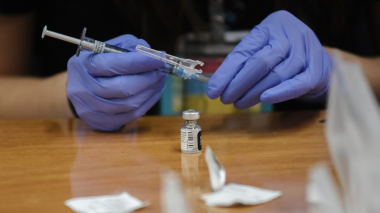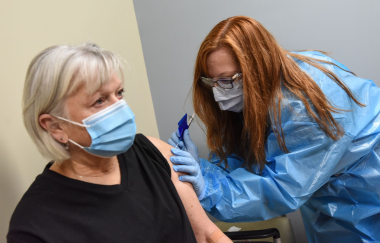 by Martha Whitecotton, RN, MSN, FACHE, senior vice president of Behavioral Health at Atrium Health
by Martha Whitecotton, RN, MSN, FACHE, senior vice president of Behavioral Health at Atrium Health
I’ve been deeply enmeshed in the details of COVID-19 all year. As a healthcare leader, I’ve attended the incident command calls; I’ve closely followed the progression of the virus through the world and then into Charlotte. Do we have enough PPE? How should we update safety requirements? My focus has been the protection of my teammates’ and our patients’ health.
All of that planning didn’t prepare me for COVID-19 coming into my home, though. Nothing really can.
My husband tested COVID-positive in early June, and my positive test came the following week. He’s now fine; I still struggle with shortness of breath and fatigue.
My story isn’t a dramatic one. I didn’t go to the hospital, and I expect to recover fully. But I wanted to share it with my teammates to thank you for your support and to show you how much it helped me – and how much it would help anyone else you know affected by this virus, whether it’s your family, colleagues or patients.
Also, I hope to break through the daily statistics to show what COVID-19 feels like to people as they live it. We hear about the number of people who are hospitalized and fighting for their lives, and we hear about those who have it and don’t even realize it. In between these two groups are millions of people who are sick at home, anxious about what’s happening, what’s next and what we don’t yet know about COVID-19.
How COVID-19 Hit Home
Last March, the great COVID pivot began. I began working from home full time, but my husband – who owns a commercial construction business – still went out to work. We transitioned just as so many other people did: Visits with our family turned into driveway-length waves, gym workouts became neighborhood walks and disinfecting became an art form.
Even still, COVID found us. On June 1, my husband left work early because he didn’t feel well. By that afternoon, he was in bed with muscle aches, fever and chills.
Two days later, the test confirmed what we already knew: He had coronavirus. We quarantined within our house, sleeping in separate bedrooms on separate floors, wearing masks when we were the same room and cleaning everything with disinfectant wipes. But by then, I’d already been exposed. I had coronavirus, too. My symptoms were different, however. I felt exhaustion (but I was working full-time while taking care of a sick husband) and couldn’t quite catch my breath (but it was allergy season in Charlotte). I suppose my biggest initial symptom might have been the most underreported COVID-19 symptom: denial.
Being a healthcare leader taught me a great deal about COVID-19. Being COVID-positive taught me even more. I’ve learned what it’s like to be a coronavirus patient, to have a virus that no one truly understands yet. I’ve also learned about myself as a worker and about my colleagues as a support system. Even though I’ve worked at Atrium Health for 32 years, I learned more than ever how fortunate I am to be a part of this team.
Five Things I Learned from COVID-19:
1. Patients are our priority. But we must take care of ourselves – and each other – too.
Working in healthcare, it’s not just our job to help others. It’s our nature. When my husband became sick, I became his caregiver. In between calls and Microsoft Teams meetings, I made food, disinfected every surface, and checked on him. I was exhausted, but it didn’t occur to me to take care of me, even as my symptoms developed. It occurred to Thomas Batchelor, MD, however, who called to check on me and insisted that I get a test. It took a colleague to remind me that I had to look out for my own health, and I’m grateful for his call and his insistence. As healthcare professionals, we can’t help others if we’re unwell.
2. Show up for each other.
My husband’s fever started the clock: A 14-day quarantine began immediately for both of us. We had no chance for one last run to the grocery store or pharmacy. My pantry and fridge were not prepared for a two-week quarantine any more than we were. I reached out to my church for help replenishing my cleaning supplies, and within days, I had enough Clorox wipes and hand sanitizer to get me through the quarantine – and then some. Without even asking, my colleagues began to send groceries, had meals delivered, and even brightened our days with flowers. It’s one thing to ask someone what they need during an illness, but it’s much more helpful to simply show up and act. With COVID-19, we can make safe assumptions about someone who’s ill: They probably could use some cleaning supplies and groceries; a delivered meal would make their day; a call or text showing concern will bring a smile. I thank everyone who showed up for me, and it was a lesson in the healing that we can all offer each other with simple, thoughtful actions.
3. Our Virtual Hospital is extraordinary.
I admit: I did not fully appreciate the power of virtual care until I became a virtual care patient. Even as a healthcare professional, you can feel pretty powerless and incompetent when you become the patient. And it's so reassuring to have another healthcare professional walking you through the process. There’s still a great deal of uncertainty about this virus, and a great deal of fear comes with it. Talking with the nurse over the phone was as reassuring as if I was talking to her in my living room.
After I would call with a question – and I had a million questions in the beginning – a nurse would call me back later to follow up. When I had difficulty breathing, they sent a community paramedicine team to give me a pulse oximeter to use at home. Whenever I became short of breath, that oximeter would show me that I was oxygenating. Just knowing that I had that safety net around me did so much to manage my illness and control my anxiety.
4. Being a Good Teammate Sometimes Means Taking a Break.
I love my work. During COVID-19, this work allows me to be part of a global and local solution, and I take great pride and joy in that role. Even while I struggled with fatigue and shortness of breath, I didn’t want to take time off. During a video meeting one day, a colleague texted my phone to tell me – nicely, yet firmly – to get off the call. She could hear that I wasn’t getting enough breath and that I needed to rest, and the rest of the team would cover me. That’s what true teamwork looks like.
It wasn’t just about me, I realized. Giving myself permission to take time off would give my team permission to take time off when they were sick, too. From then on, I became more upfront with my team that I had COVID-19 and how much it affected me. I started to cancel meetings. I took a couple days off entirely, and when I relapsed – twice – I took more days off. Which leads me to…
5. COVID-19 is Not a Two-Week Illness.
My assumption when I was diagnosed was that a mild case of COVID-19 meant a two-week illness. I’m on week eight. After two relapses, this virus has kept me exhausted, out of breath and away from my friends and family for two months. Close friends and colleagues continue to deliver groceries and provide impromptu meals. Some send my favorite kind of medicine: chocolate. To be sick this long has given me even greater compassion for the patients we care for with chronic illnesses. While a lot of attention comes during the days following diagnosis, it’s important to check in with those who are sick for weeks, months or longer when they’re running out of energy and resilience.
As we’ve all learned, COVID-19 will be with us for a long time. Some of you have had it already; others of you will. Some of you have become expert COVID caregivers; others will learn how. As Atrium Health teammates, we need to extend the understanding and support we offer our patients to each other, too.
Thank you all for what you’ve done for me during the past couple months. And one day, if I ever text you and tell you – nicely, yet firmly – to get off a call and get some rest, you’ll know: This is what true teamwork looks like.



